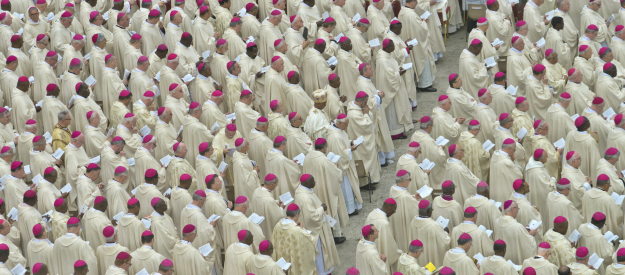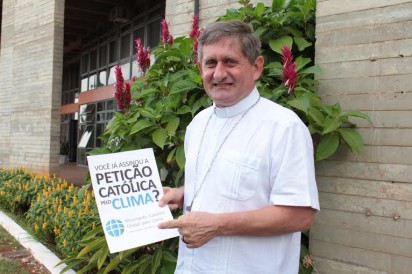"We are losing our attitude of wonder, of contemplation, of listening to creation and thus we no longer manage to interpret within it what Benedict XVI calls 'the rhythm of the love-story between God and man.'"
+ Pope Francis
Supporting our shepherds

With news these past few weeks about the support for Laudato Si’ and a Catholic climate petition by many bishops of the Philippines, Africa, and South America, some in the Catholic eco-sphere are complaining that United States bishops aren’t doing enough to support Pope Francis’s call to care for creation. Others, however, see things differently.
The discussion is typically not public but it has (not surprisingly) fallen along the partisan divides that frame most discussions here in the States. To use the sloppy but readily identifiable terminology of Right and Left, a good many on the Right are either uninterested in the Church’s engagement of ecology or they are unhappy about it. Many on the Left—who have been in the trenches of eco-protection for decades—are impatient. They see their role as advancing the mission of Pope Francis with or without the bishops.
A third group, encompassing all ideologies, understands the ecological crises of our time and wants the Church engaged. They are celebrating what has been done to date and are helping more get done by working with the hierarchy of the one, holy, catholic, and apostolic church.
The bishops of the Southern Hemisphere
This week the church in the Philippines kicked off the Season of Creation with the support—liturgical and otherwise—of not just a host of bishops but also from Luis Cardinal Tagle. And in July Archbishop Socrates B. Villegas, president of the Catholic Bishops’ Conference of the Philippines, signed this pastoral eco-statement on behalf of his brother bishops.
Going forward, staff and volunteers in the dioceses of the Philippines are working overtime to collect one million signature for the Global Catholic Climate Movement’s climate petition.
 In Brazil—another nation reeling from ecological devastation—presidents of various commissions of the Brazilian Bishops Conference have been showing their support for the Global Catholic Climate Movement and its petition with a series of groundbreaking photos. Coordinated by local eco-advocates working with the GCCM, the signs and the smiles show everyone where the bishops stand on climate change. (The signs they hold say "Have you signed the Catholic Climate Petition?")
In Brazil—another nation reeling from ecological devastation—presidents of various commissions of the Brazilian Bishops Conference have been showing their support for the Global Catholic Climate Movement and its petition with a series of groundbreaking photos. Coordinated by local eco-advocates working with the GCCM, the signs and the smiles show everyone where the bishops stand on climate change. (The signs they hold say "Have you signed the Catholic Climate Petition?")
The US response
Such high-profile activities often stand in contrast with much of the US episcopal reception of both Laudato Si’ and recent Catholic climate advocacy. Some social justice advocates have said that the US bishops are “failing to support Pope Francis” at a time when the world needs to hear and act on his eco-statements.
But the bishops of the world are not a homogenous army of mid-level managers. And as we saw in some spots with the reception on Humane Vitae (Paul VI's encyclical that, among other things, endorsed the Church's teaching on contraception), sometime bishops will not be supportive of edicts from Rome.
Any irregular reception of Laudato Si' by the bishops of the world does not, however, include the open defiance we saw with Humane Vitae. Rather it has much to do with how bishops must apply the words of the Gospel and the Church in ways that are applicable and meaningful to those they shepherd and to where they shepherd them. Moving among them is the Holy Spirit. It is He who elevates the particular nature of the people of a particular place. Thus the work of the Spirit will often seem different from place to place and age to age.
“The relative reluctance of some U.S. Bishop to endorse the Global Catholic Climate Movement can probably be explained by the fact the bishops often reflect the sensibilities of their own country,” said Dr. James Keating, a theologian and commentator on Catholic ecclesial history at Providence College.
“Americans, for instance, are less likely to believe that global warming is a catastrophic threat requiring substantial governmental action than South Americans or Africans,” he said.
“Another factor might be that Americans are normally more skeptical of international initiatives than one finds in the developing world."
Complicating such matters is the cultural divide within the United States between the teachings of the Church and the sudden shifts in social and legal expectations. With religious freedoms at stake in the wake of federal health mandates and court rulings on same-sex marriage, some US bishops have found support only from the very people who are often not supportive of ecological initiatives—especially those that involve the reduction of fossil fuels.
And yet …
“The political backdrop of this discussion is starting to shift,” Notre Dame’s Dr. Celia Deane-Drummond told Catholic Ecology. She said that there has been a move from denial of the existence of climate change to a stress on adaptation (rather than mitigation) as a way forward.
While not enough for some (especially those demanding immediate cuts in fossil fuel use), the acceptance by others of the need to adapt to climate change is a notable and welcome shift—even if we need to do much more.
But even now there is ample evidence of eco and climate engagement by bishops across the United States.
As always, Stockton’s Bishop Stephan Blaire has been a leader in all things ecological. He and two of his brother bishops, Armando Xavier of Fresno and Jaime Soto of Sacramento, published a commentary on the moral necessity to engage climate change a few months ago. This week the bishops supported state legislation in the Golden State that would cut greenhouse emissions. This got the attention of international news outlets.
Chicago’s Archbishop Blase Cupich also made news a few weeks back for confirming his diocesan efforts to be better energy users and stewards of creation.
In Richmond Virginia last week, Bishop Francis DiLorenzo led a forum on climate change that included David Titley, a retired rear admiral who was director of the Navy’s climate change task force.
Next week the Minnesota Catholic Conference, along with Catholic Rural Life and University of St. Thomas Center for Catholic Studies, will host Natural and Human Ecology: A panel discussion on Laudato Si'. The panel will include Cecilia Calvo, Project Coordinator of the Environmental Justice Program of the United States Conference of Catholic Bishops.
And my own diocese will be announcing the opening of a series on Laudato Si’ in November with a panel hosted by Bishop Thomas Tobin focusing on climate change in light of December's COP21 climate talks in Paris.
This last example makes an important point. Bishop Tobin is known nationally for his outspoken defense of Catholic teachings on marriage and human life. Among long-time eco-activists in the Church, however, Bishop Tobin is not known for being outspoken on ecology.
And yet his diocese’s newspaper, the Rhode Island Catholic, has published a regular column on ecology since 2004. (I’m not sure of many others that do.) Last winter the diocese began working with the state’s energy office and power company to help parishes (and eventually parishioners) with energy efficiency and renewables. It also supports Rhode Island Interfaith Power and Light and holds public events for the Feast of St. Francis. These invite all people to friendly dialogue about our environmental crises and their causes — which is what Pope Francis asks of us in Laudato Si’.
And speaking of Laudato Si’, on the day the encyclical was released, the Diocese of Providence, with the bishop's blessing, sent an e-blast cheering the document as well as the Catholic perspective of ecology.
When I shared a copy of this e-blast with a group of fellow Catholic eco-colleagues, one wrote back: “Wow I am shocked that Bishop Tobin did this. Maybe the Holy Spirit is working.”
Onward and upward
My colleague was right. The Holy Spirit is working. And the medium through which He works most especially is the Church. That is, through our bishops and our support of each other—and that includes our support of our bishops.
Over the last few months I’ve asked Bishop Tobin for backing on a number of eco-events and he has endorsed all of them because—and here’s the important part—he knows and trusts me. As always, it’s human relationships that build up the common good. And as Laudato Si' tells us, good relationships are what we need at this critical time for the Church and the world.
“As the encyclical makes clear,” said scientist-turned-theologian Dr. Deane-Drummond, “the responsibility for environmental protection is not an option for any Christian. Therefore the US bishops have a particular and peculiar responsibility to be a midwife to a new kind of birthing in the Western, industrial nations of the world, and US in particular, that bears the fruit of deep ecological conversion.
“The health of the planet and its peoples, many of whom are already suffering devastation in the African and Latin American sub-continents, may well depend on the collective action of those in the richer nations of the world. This is what integral ecology means, a recognition of interdependence at all levels and across generations. I urge the US bishops therefore not to lose heart, but to encourage their priests and people to take positive steps for change and in firm hope that another world is possible.”
For some bishops, engaging in ecology and climate issues will happen without prompting. It is simply part of their episcopal and personal mission. Others will have other priorities—like marriage, life, religious freedom, which Pope Francis tells us are all part of an integrated ecology.
For the sake of so many people now and in the future—for the sake of life on Earth—this latter group of bishops may need our support from time to time to help their flock better care for our common home. They may need us to offer ideas or hear about our support for ecology.
And so in whatever way that each of us can, let us support them.
Top photo: Bishops at the Canonization of St. John Paul II. Flicker/Aleteia Image Department
Photo of Dom Vilson Basso, Comissão Episcopal Pastoral para a Juventude: Igor Bastos


















